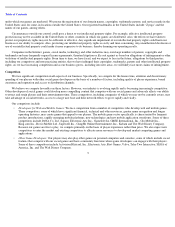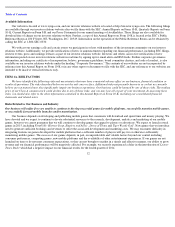Zynga 2014 Annual Report Download - page 21
Download and view the complete annual report
Please find page 21 of the 2014 Zynga annual report below. You can navigate through the pages in the report by either clicking on the pages listed below, or by using the keyword search tool below to find specific information within the annual report.
Table of Contents
purchasing functionality regularly or for a prolonged basis, or other similar issues arise that impact our ability to generate revenues on the
Facebook platform, it could have a negative impact on our revenues and operating results.
To be successful, we must increasingly leverage the global connectivity and distribution of mobile platforms, making the success of our
business dependent on this technology and our relationships with mobile platform providers, which in many cases have the unilateral ability
to interpret their policies and terms and conditions for applications and developers.
Our social games increasingly leverage the global connectivity and distribution of mobile platforms including Apple’s App Store for iOS
devices and the Google Play App Store for Android devices. Our games are distributed on these platforms and the virtual items we sell in our
games are purchased using the payment processing systems of these platform providers. In the fourth quarter of 2014, 60% of our bookings were
generated through mobile platforms. We are subject to the standard policies and terms of service of these third party platforms, which govern the
promotion, distribution and operation of games on the platform and can be changed by the platform providers, in their sole discretion, at any
time. Such changes may decrease the visibility or availability of our games, limit our distribution capabilities, prevent access to our existing
games, reduce the amount of bookings and revenue we may recognize from in-game purchases, increase our costs to operate on these platforms
or result in the exclusion or limitation of our games on such third party platforms. Any such changes could significantly harm our business in
both the short-term and long-term.
If we violate, or a platform provider believes we have violated its terms of service, it could limit or discontinue our access to the platform,
which would harm our business.
We also rely on the continued functionality of the Apple App Store and the Google Play App Store. If our players or potential players are
not able to access our games through these platforms or encounter difficulties in doing so, we may lose players, resulting in decreased bookings
and revenue. The level of service provided by these storefronts may also impact the purchase, usage and satisfaction with the virtual goods or
currency purchased by our players, adversely affecting our business and profitability. Further, in the past these digital storefronts have
experienced interruptions in service or issues with their in-app purchasing functionality. If these types of interruptions were to occur regularly or
for a prolonged basis, or other similar issues arise that impact our ability to generate revenues from these storefronts, it could have a negative
impact on our revenues and operating results.
Apple
’s new requirement that all new applications submitted to the Apple App Store must include 64-bit support, which is scheduled to
become effective in 2015, could harm our business.
Apple recently informed developers that beginning on February 1, 2015, all new applications that are submitted to the Apple App Store
must include 64-bit support and be built with the iOS 8 software development kit, with certain exceptions. Games that are currently live must
include 64-bit support and be updated by an update built with the iOS 8 software development kit by June 1, 2015. Depending on date of
submissions, games built on the Unity game engine (“Unity”) may be given until June to comply with the update requirements. We currently
have efforts underway to adapt our current games and future games to support 64-bit and be built with the iOS 8 software development kit. If
Apple does not modify or delay this requirement, we would be required to implement 64-bit support for all of our games currently under
development that we intend to launch after February 1, 2015 as well as any of our currently released games that we intend to launch or update
after February 1, 2015. This will involve significant development and expense and may cause the anticipated release date for some or all of our
games currently under development to be pushed out, which would negatively impact our revenues in 2015 and potentially beyond. In addition,
due to the significant expense involved in supporting 64-bit development, we might decide not to continue updating certain of our existing
games after February 1, 2015 that we otherwise would have continued to update, which would cause the revenues that we generate from these
games to decline more quickly than they otherwise would have. Furthermore, building our games to
18
























